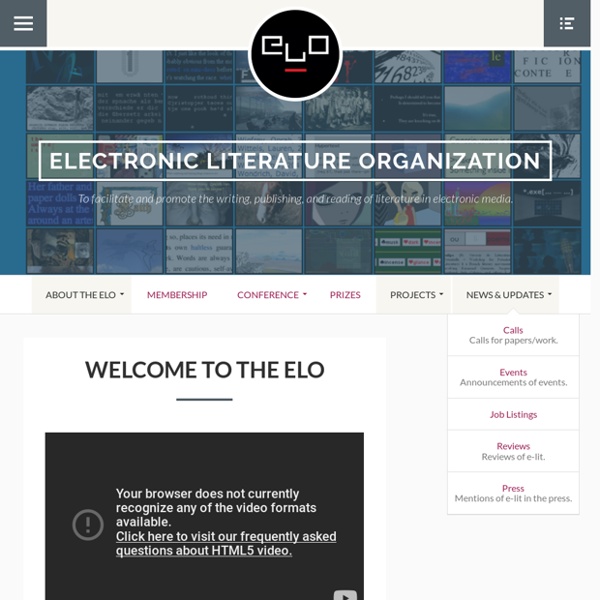



Norval Morrisseau original paintings May 2018 Coghlan Art proudly presents available work by this great Canadian artist. Norval was instrumental in the creation of our studio . His presence was a reminder of what an artist really is. Norval's work is in museum and private collections around the world.
How Machines Write Poetry As a teenager in Vermont, Sarah Harmon used Java to create a computer program that wrote poetry. She named it OGDEN. Then she submitted one of its poems in 2008 to her high-school literary magazine under the pen name Dan Goshen, an anagram of Ogden Nash. Generated Detective #1 Generated Detective #1 by Greg Borenstein next Generated from a series of fragments of public domain detective books on 11/6/2014 for NaNoGenMo Banipal (UK) Magazine of Modern Arab Literature - Selections - Banipal No 10 - Rachida el-Charni The walls of Abbas Beydoun’s Beirut office are bare; the coffee table between us is covered with books, magazines, newspaper clippings, unopened correspondence, and every fifteen minutes a man walks in with handwritten newspaper copy to check with Beydoun, editor of the cultural page of as-Safir daily newspaper. Abbas Beydoun is a busy man and prefers to work at night, which is when we make our appointment. Over three hours, a couple of cups of coffee and plenty of phone and work interruptions, Abbas Beydoun, one of Lebanon’s foremost poets of the post civil war era, talks about his life, his experience as a poet, and about poetry in Lebanon to Camilo Gomez-Rivas. The war made life narrow and small With the start of the war, I stopped writing because I had a huge problem with the practice of writing.
How to make a Twitter Bot with Google Spreadsheets (version 0.4) – Zach Whalen Do you like Twitter bots? I know I sure do. I like following them, and I like making them. I also like introducing my students to bots as one way to do creative things in a networked digital context. That’s way, back in 2013, I cobbled together a simple tool built on a Google Spreadsheets that lets anyone create a simple bot without having to write any code. There are many other ways to make a Twitter Bot, but I like this approach for its clarity and hopefully its accessibility for non-programmers to start understanding how to think about language through programming.
throw in at the deep end English[edit] Etymology[edit] From allusion to an actual swimming pool. My Father's Long, Long Legs © 2015 by michael lutz | Originally published at Correlated Contents, August 2013, August 2013. Reprinted with permission. | Cover Art © 2015 Cover photo by Jessamyn West. Used with permission. A tall tale. A young girl's father starts digging in the basement... and never stops. Reading by Talan Memmott On Thursday evening Feb 17th, in HF 301 from 5-6:30PM, visiting research and artist Talan Memmott will show and discuss some of his creative work including electronic literature and video work. Talan Memmott is Assistant Professor / adjunkt in the Literature, Culture & Digital Media program at Blekinge Tekniska Högskola in Karlskrona, Sweden, and is both a researcher and an artist. He holds an M.F.A. in Electronic Writing, Brown University. He has written and created many influential works and is deeply involved in the field of electronic literature. Some of Talan's e-lit, video, critical writing and other curiosities can be found at: Talan is also to be congratulated for the release this week of the Electronic Literature Collection, Volume 2: -- which includes 63 works of electronic literature.
Electronic Literature and Its Emerging Forms Talan Memmott is a Lecturer in Digital Culture at Blekinge Institute of Technology in Sweden. He holds an MFA in Literary Arts/Electronic Writing from Brown University and a PhD in Interaction Design from Malmö University. Memmott is a practicing artist, an academic, and a media theorist. His creative work has been presented at numerous conferences and festivals, and been the subject of a number of critical articles and books. Enigma n home page Enigma n 1998, by Jim Andrews. An online philosophical poetry toy for poets and philosophers from the age of four up. “Enigma n” and “Seattle Drift” by Jim Andrews: The Cauldron & Net Editions – I ♥ E-Poetry When Jim Andrews published these poems in Cauldron& Net, Volume 1 in 1999, their original DHTML and JavaScript codes were compatible with the two main Web browsers of their time: Netscape Navigator 4 and Internet Explorer 4 (IE). This was during the peak of what is known as the “first browser war” in which IE became the dominant browser in the market. At the time, each browser was implementing code differently, creating code incompatibilities that led to the practice of detecting browsers to redirect readers to different versions of the document, or determining what part of the code was executed in a specific session. Some writers opted to pick a browser and directed readers to view the work on that one, while others sought cross-browser compatibility.